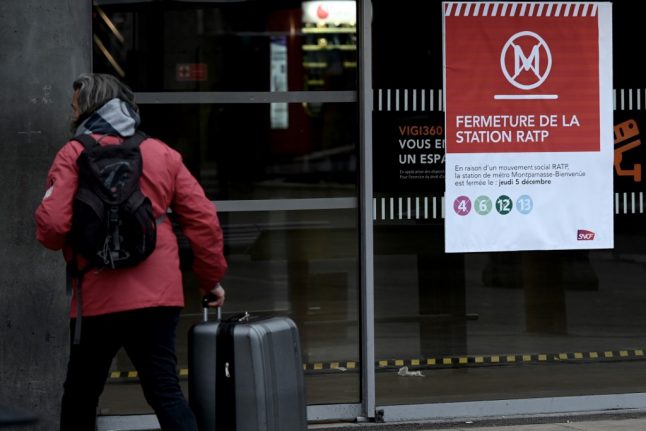For the first time since the strikes began on December 5th, only two Metro lines – lines 7bis and 13 – are completely closed, although most of the others are running a reduced service.
With talks between the government and the unions not set to restart until January 7th, and a war of words between the two parties over the weekend, the strikes over proposed changes to the French pension system look set to continue for some days yet.
Here's how services are looking on Monday, December 30th:
In Paris things are looking up slightly with more services running, although as a whole the transport network is still badly disrupted.
[Mouvement Social]⚠️Le trafic pour le lundi 30 décembre restera très perturbé, avec toutefois une amélioration significative par rapport au vendredi 27 pour tous les modes de transport notamment sur le #métro et #RER #RATP.Le détail des prévisions⬇️& sur https://t.co/OElUNYGYky pic.twitter.com/W26PSaWzBx
— RATP Group (@RATPgroup) December 29, 2019
On the Metro only lines 1 and 14 – which are automated – are running as normal. But only lines 7bis and 13 remain closed completely, all others are offering a limited service.
Lines 3, 4, 5, 7, 8, 9 and 10 are offering a rush hour only service – running from 6.30am to 9.30am and 4.30pm to 7.30pm.
Lines 2 and 11 are running morning rush hour only, line 3bis is running afternoon only and lines 6 and 12 are running evening rush hour only.
On the tram network things are largely back to normal, with lines 3a, 7 and 8 running a 'quasi normal' service all day and the other lines running as normal.
The RER suburban train network remains disrupted with fewer trains than normal and running only at limited periods, while on the buses three quarters of the normal services are running.
On the railways things are again disrupted but not as badly as in the early days of the strike.
? CIRCULATION DES TRAINS le 30 décembre ?
? Retrouvez l’info en temps-réel la veille dès 17h sur l’#AssistantSNCF ? https://t.co/eiZMVDEquX pic.twitter.com/PFdg8Q0kAc— SNCF (@SNCF) December 29, 2019
Overall half the normal high speed TGV services are running and half the budget Ouigo services.
The local network is worst affected with a quarter of suburban Transilien trains and Intercité routes and just four in 10 of the normal local TER services.
The disruption affects international services including the Eurostar, which has already published on its website a limited timetable running until January 3rd.
There are no reported flight disruptions and Eurotunnel's Le Shuttle service is running as normal.



 Please whitelist us to continue reading.
Please whitelist us to continue reading.